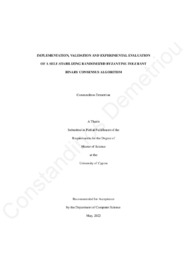| dc.contributor.advisor | Georgiou, Chryssis | en |
| dc.contributor.author | Demetriou, Constandinos | en |
| dc.coverage.spatial | Cyprus | en |
| dc.creator | Demetriou, Constandinos | en |
| dc.date.accessioned | 2022-06-03T09:38:40Z | |
| dc.date.available | 2022-06-03T09:38:40Z | |
| dc.date.issued | 2022-05-31 | |
| dc.identifier.uri | http://gnosis.library.ucy.ac.cy/handle/7/65254 | en |
| dc.description.abstract | Binary consensus is a problem in which a set of processors must agree on a single binary value. In asynchronous systems, where a subset of the processors may be malicious, this challenge gets more challenging. We study malicious and more serious problems in this work: transient faults. These are temporary violations of the system's operating assumptions that might cause the system's state to change unexpectedly, making recovery impossible without human intervention. We implement an existing protocol for randomized Byzantine-tolerant binary consensus algorithm that is loosely-self-stabilizing using the Go programming language and the ZeroMQ communication framework. This approach is optimal in terms of resilience and termination, requires only bounded memory, and ensures that the system will automatically converge to a legal state. This is the first time-free Byzantine-tolerant binary consensus algorithm to make such guarantees, to our knowledge. We describe the first known implementation of this algorithm in this work. With this implementation, we were able to: (a) validate the algorithm; (b) compare the algorithm to its non-stabilizing version and estimate the cost of self-stabilization in terms of processing time and message load; and (c) notice that different failures in the system (whether due to transient faults or malicious behavior) have no significant overhead on recovery and decision time. | en |
| dc.language.iso | eng | en |
| dc.publisher | Πανεπιστήμιο Κύπρου, Σχολή Θετικών και Εφαρμοσμένων Επιστημών / University of Cyprus, Faculty of Pure and Applied Sciences | |
| dc.rights | CC0 1.0 Universal | * |
| dc.rights | info:eu-repo/semantics/openAccess | en |
| dc.rights | Open Access | en |
| dc.rights.uri | http://creativecommons.org/publicdomain/zero/1.0/ | * |
| dc.title | Implementation, validation and experimental evaluation of a self-stabilizing randomized Byzantine-tolerant binary consensus algorithm | en |
| dc.type | info:eu-repo/semantics/masterThesis | en |
| dc.contributor.committeemember | Marcoullis, Ioannis | en |
| dc.contributor.committeemember | Philippou, Anna | en |
| dc.contributor.department | Τμήμα Πληροφορικής / Department of Computer Science | |
| dc.subject.uncontrolledterm | DISTRIBUTED SYSTEMS | en |
| dc.subject.uncontrolledterm | BINARY CONSENSUS | en |
| dc.subject.uncontrolledterm | SELF-STABILIZATION | en |
| dc.subject.uncontrolledterm | BYZANTINE FAULT-TOLERANCE | en |
| dc.subject.uncontrolledterm | RANDOMIZATION | en |
| dc.author.faculty | Σχολή Θετικών και Εφαρμοσμένων Επιστημών / Faculty of Pure and Applied Sciences | |
| dc.author.department | Τμήμα Πληροφορικής / Department of Computer Science | |
| dc.type.uhtype | Master Thesis | en |
| dc.contributor.orcid | Georgiou, Chryssis [0000-0003-4360-0260] | |


